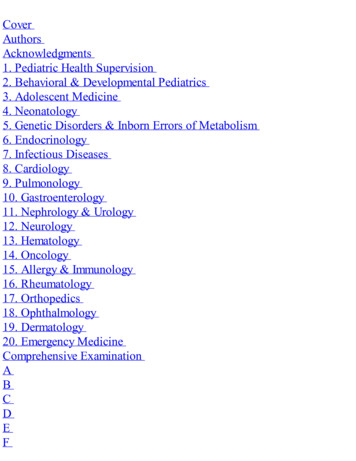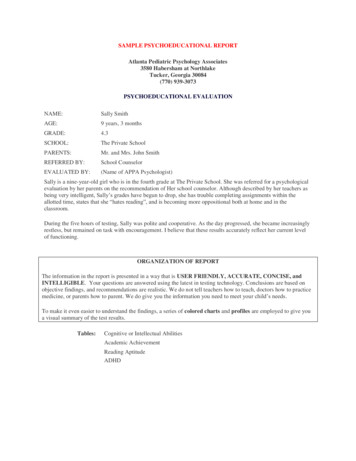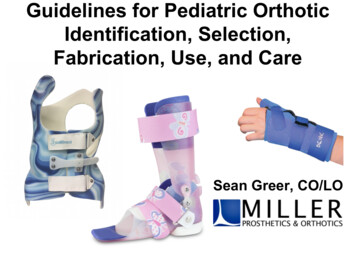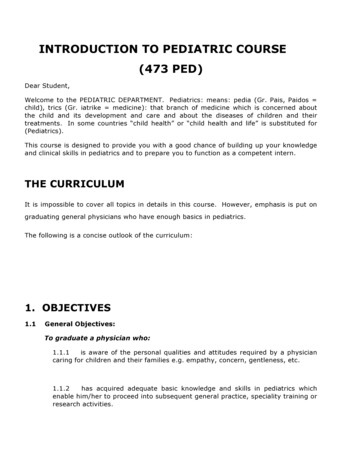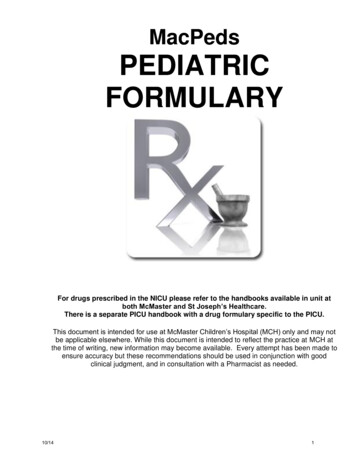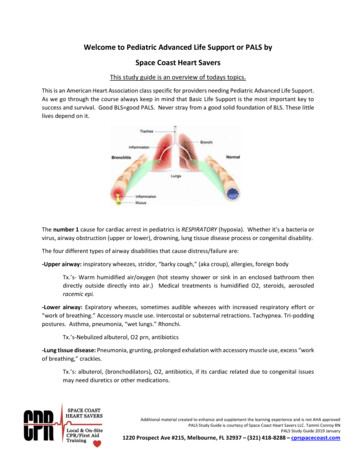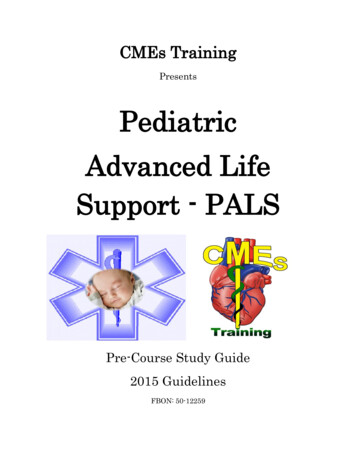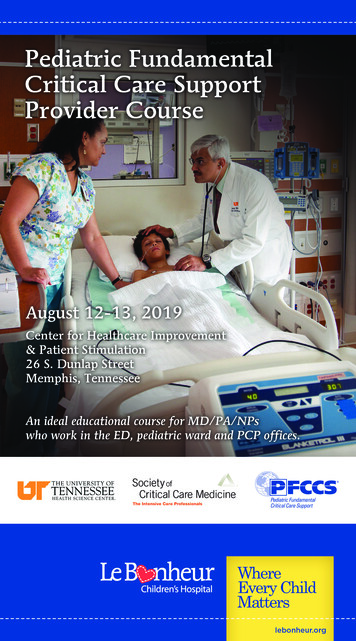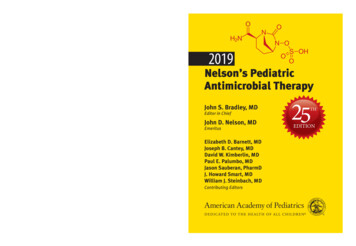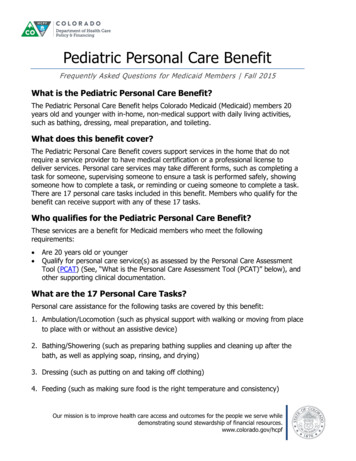
Transcription
Pediatric Personal Care BenefitFrequently Asked Questions for Medicaid Members Fall 2015What is the Pediatric Personal Care Benefit?The Pediatric Personal Care Benefit helps Colorado Medicaid (Medicaid) members 20years old and younger with in-home, non-medical support with daily living activities,such as bathing, dressing, meal preparation, and toileting.What does this benefit cover?The Pediatric Personal Care Benefit covers support services in the home that do notrequire a service provider to have medical certification or a professional license todeliver services. Personal care services may take different forms, such as completing atask for someone, supervising someone to ensure a task is performed safely, showingsomeone how to complete a task, or reminding or cueing someone to complete a task.There are 17 personal care tasks included in this benefit. Members who qualify for thebenefit can receive support with any of these 17 tasks.Who qualifies for the Pediatric Personal Care Benefit?These services are a benefit for Medicaid members who meet the followingrequirements: Are 20 years old or youngerQualify for personal care service(s) as assessed by the Personal Care AssessmentTool (PCAT) (See, “What is the Personal Care Assessment Tool (PCAT)” below), andother supporting clinical documentation.What are the 17 Personal Care Tasks?Personal care assistance for the following tasks are covered by this benefit:1. Ambulation/Locomotion (such as physical support with walking or moving from placeto place with or without an assistive device)2. Bathing/Showering (such as preparing bathing supplies and cleaning up after thebath, as well as applying soap, rinsing, and drying)3. Dressing (such as putting on and taking off clothing)4. Feeding (such as making sure food is the right temperature and consistency)Our mission is to improve health care access and outcomes for the people we serve whiledemonstrating sound stewardship of financial resources.www.colorado.gov/hcpf
Personal Care FAQ For MembersPage 2 of 105. Hygiene – Hair Care/Grooming (such as shampooing, conditioning, simple, nonprofessional styling, and combing)6. Hygiene – Mouth Care (such as brushing, flossing, swabbing teeth, and rinsingmouth)7. Hygiene – Nail Care (such as soaking, filing nails, and cuticle care)8. Hygiene – Shaving (such as shaving face, legs, and underarms with electric or safetyrazors)9. Hygiene – Skin Care (such as applying over-the-counter lotion or other skin careproducts)10. Meal Preparation (such as preparing, cooking, and serving food)11. Medication Reminders (such as verbally communicating that it is time for medicationand opening a pre-filled container)12. Mobility – Positioning (such as moving an individual to a new position in awheelchair while keeping the body properly aligned)13. Mobility – Transfer (such as physically supporting an individual to safely move anindividual from bed to a wheelchair next to the bed)14. Toileting – Bladder Care (such as assisting an individual with using a toilet orbedpan, changing a diaper, emptying and rinsing the bedpan, and cleaning skin)15. Toileting – Bowel Care (such as changing and cleaning an individual after a bowelmovement, assisting an individual using the bathroom, and changing any clothing orpads)16. Toileting – Bowel Program (such as emptying an ostomy bag)17. Toileting – Catheter Care (such as emptying a catheter bag)The Personal Care Assessment Tool includes detailed information about when each ofthese tasks may need skilled care instead of non-skilled personal care.If you need personal care support for any tasks not covered bythis list, additional support may be available. Call the PediatricOur mission is to improve health care access and outcomes for the people we serve whiledemonstrating sound stewardship of financial resources.www.colorado.gov/hcpf
Personal Care FAQ For MembersPage 3 of 10Personal Care Line at 303-866-3447 or emailPersonalCare@state.co.us with any questions about these or otherpersonal care tasks.What is the difference between skilled care services and personalcare services?Skilled care services are in-home medical services provided to treat a medical condition.Skilled care services must be provided by a certified nursing assistant (CNA) orregistered or licensed nurse. The Home Health Benefit offers skilled care services tomembers with a medical need.Personal care services support members who need assistance with daily living tasks,when these services can be provided by someone without a CNA or nursing license orregistration.The Personal Care Assessment Tool lists the differences between skilled care andpersonal care for each personal care task to make it easier for families to understandwhich type of care is right for each task. Please see the “What is the Personal CareAssessment Tool (PCAT)?” section below for more information.For more information about Home Health services, see the Home Health Benefit webpage or the Pediatric Assessment Tool FAQs.What is the Personal Care Assessment Tool (PCAT)?The Personal Care Assessment Tool is a way to consistently evaluate an individual’sneed for personal care services. The PCAT assesses the need for personal care supportfor each of the 17 Personal Care Tasks. See the “What are the 17 Personal CareTasks?” section above for more information. There is also space in the PCAT to includeadditional information about an individual’s need for personal care services. Note:although you can participate in completing the PCAT, your personal care provider isresponsible for submitting the document for the prior authorization request (PAR)process.The PCAT is not the only document evaluated to determine the amount of personal careservices that an individual is eligible to receive. The Colorado Medicaid third-partyvendor will also look at the Plan of Care and any additional documents that yourpersonal care provider submits.The Personal Care Assessment Tool is available on the Department’s website.What is a 485 Home Health Certification and Plan of Care?Our mission is to improve health care access and outcomes for the people we serve whiledemonstrating sound stewardship of financial resources.www.colorado.gov/hcpf
Personal Care FAQ For MembersPage 4 of 10The 485 Home Health Certification and Plan of Care (Plan of Care) is a form that allowsdoctors to document in detail the kinds of in-home health services that their patientneeds and how often they need each service. This form is required for families applyingfor the Personal Care Benefit, as well as the Home Health Benefit. The same Plan ofCare form may be used for requesting both personal care services and Home HealthBenefits, as long as the form states the need for both of those services. Many providersuse an electronic version of this form that includes the same content. As long as allelements of the 485 are included, the Plan of Care will be accepted.I am getting skilled care services through the Home HealthBenefit. How will this new benefit affect my services?Your home health services will not change. You may qualify for additional servicesthrough this benefit. A Medicaid member must meet the requirements listed above toqualify for personal care services. Please see the “Who Qualifies for Pediatric PersonalCare Services?” section above for more information.Not all home health agencies offer personal care services. If you qualify for both homehealth and personal care services, you may receive services from two differentproviders.Both Home Health and Personal Care Benefits provide services for defined tasks. If youare receiving skilled care for a task through the Home Health Benefit, you will notreceive personal care for that same task. If any part of a task requires the skills of aCNA or registered or licensed nurse, the whole task will be considered a skilled caretask, covered by the Home Health Benefit.For example, if you need skilled assistance with moving into a bathtub orshower, then the bathing task is also considered a skilled task and coveredunder the Home Health Benefit. However, if you need a sponge bath or ashower that does not require a skilled transfer, then the bathing task isconsidered a Personal Care task and covered under that benefit.I am getting services through one of Colorado’s Home andCommunity-Based Services (HCBS) waivers. How will this newbenefit affect my services?Most of the personal care services provided for individuals enrolled in waivers will nowbe available through the Pediatric Personal Care Benefit.Our mission is to improve health care access and outcomes for the people we serve whiledemonstrating sound stewardship of financial resources.www.colorado.gov/hcpf
Personal Care FAQ For MembersPage 5 of 10If you currently receive personal care services through a waiver, you will need to accessthose services through the Personal Care Benefit when your annual Service Plan isrenewed. You have the option to transition sooner if you want.If you are receiving personal care services through the following waivers you may needto transition from waiver personal care services to the Personal Care Benefit: Brain Injury (BI)Elderly, Blind and Disabled (EBD)Community Mental Health Supports (CMHS)Spinal Cord Injury (SCI)Supported Living Services (SLS)Children’s Extensive Support (CES)Your case manager will help you coordinate the transition from waiver personal careservices to Personal Care Benefit services.If you are on one of the following waivers, which do not include personal care services,you may now be eligible for services through the Personal Care Benefit: Children with Autism (CWA)Children with Life Limiting Illness (CLLI)Children’s Home and Community Based Services (CHCBS)A personal care provider will need to complete a Prior Authorization Request (PAR) forthese services. Your case manager will help you start this process.If you need personal care services for tasks not covered by the Pediatric Personal CareBenefit, you may still get those services through the standard waiver process. Youshould speak to your case manager for more information.You do not qualify for Pediatric Personal Care Benefit services if you are currentlygetting services through any of the programs listed below because personal careservices are provided as a primary component of them: Consumer-Directed Attendant Support Services (CDASS)In-Home Support Services (IHSS) (except through the CHCBS waiver, which doesnot provide personal care)Home Care Allowance (HCA)HCBS-Persons with Developmental Disabilities (DD) waiverHCBS-Children’s Habilitation Residential Program (CHRP) waiverOur mission is to improve health care access and outcomes for the people we serve whiledemonstrating sound stewardship of financial resources.www.colorado.gov/hcpf
Personal Care FAQ For MembersPage 6 of 10See the “How can I start receiving the personal care services through this benefit?”section below for information on how to start the process of qualifying for services.I receive a Home Care Allowance to cover personal care services.Can I also get Medicaid personal care services?No, Medicaid members can enroll in only one of these two programs: the Home CareAllowance program, which is managed by each county’s Department of Human or SocialServices, or the Pediatric Personal Care Benefit.How can I find a personal care provider?You can find a personal care provider through home care agencies that offer personalcare services. There are several home care agencies in Colorado that provide personalcare services. You can find a list of these agencies on the Department website. If youdon’t have access to the Internet, you may leave a message on the Pediatric PersonalCare Line at (303) 866-3447 or email PersonalCare@state.co.us. Medicaid staff willreturn your call within one business day to help you find a provider.If you are enrolled in a waiver program, contact your case manager for help gettingconnected to local personal care agencies.I cannot find a personal care provider. What can I do?There is at least one personal care agency operating in every county of Colorado. If youhave called all the agencies that are in your region and are having trouble finding apersonal care provider to work with you, call the Pediatric Personal Care Line at (303)866-3447 or email PersonalCare@state.co.us. Medicaid staff will return your call withinone business day and offer you one-on-one support.If you are enrolled in a waiver program and/or have a case manager, contact your casemanager for help connecting to local agencies.What are the qualifications of personal care providers?Personal care workers must meet the following qualifications:1. Have verified experience and training for providing personal care services2. Employed by a licensed home care agency3. Are 18 years of age or olderHome care agencies are responsible for hiring and supervising experienced personalcare workers. While there is no certification for personal care workers, their home careagency employers are licensed by the Colorado Department of Public Health andOur mission is to improve health care access and outcomes for the people we serve whiledemonstrating sound stewardship of financial resources.www.colorado.gov/hcpf
Personal Care FAQ For MembersPage 7 of 10Environment (CDPHE). Home care agencies have to meet many requirements to earntheir license. CDPHE monitors all home care agencies to ensure that they are providingthe best possible care to their clients.Can I provide personal care services to my family memberthrough this benefit?The federal Centers for Medicare and Medicaid Services (CMS) set rules about who canprovide Personal Care Benefit services. According to the federal rules, an adult who islegally responsible for a dependent individual is not allowed to get paid by Medicaid forproviding personal care services to that individual. This means that parents, spouses,and other legally responsible adults cannot be reimbursed for providing personal careservices to their own children, spouses, or otherwise dependent individual.How can I start getting personal care services through thisbenefit?If you need personal care, you can start by talking to any of the following: Your case manager or care coordinator, if you have oneYour physicianA local home care agency that offers personal careMedicaid staff: call the Colorado Medicaid Pediatric Personal Care phone number,(303) 866-3447, or email PersonalCare@state.co.us, and Medicaid staff willreturn your call or email within one business day.Your case manager, physician, or personal care agency will be able to start the processto request personal care. Your doctor and personal care provider will need to completetwo required documents:1. Personal Care Assessment Tool (PCAT). The PCAT needs to be completed byyour personal care provider.2. 485 Home Health Certification and Plan of Care Form (or another form with thesame content) (Plan of Care). The Plan of Care Form needs to be completed byyour doctor.The Plan of Care Form must order in-home personal care services and describe in detailwhat services are medically necessary and how often they are needed. The personalcare provider will submit the completed forms in an online Prior Authorization Request(PAR). The PAR process verifies that personal care services are medically necessary andright for you. All personal care services must be requested through this process.Our mission is to improve health care access and outcomes for the people we serve whiledemonstrating sound stewardship of financial resources.www.colorado.gov/hcpf
Personal Care FAQ For MembersPage 8 of 10If Colorado Medicaid’s PAR vendor approves your PAR, you can then work with yourpersonal care provider to start getting services. Each approved PAR is valid for up toone year. If you need personal care services for the next year, your personal careprovider must submit a new PAR, with a new Plan of Care from your doctor and a newPCAT.How can I determine whether personal care services aremedically necessary for me?Your doctor will be able to tell you if your diagnosis, condition, or symptoms makepersonal care medically necessary for your day-to-day life.I need personal care at an after-school program not covered bymy Individual Education Plan (IEP). What can I do?You are allowed to receive Personal Care Benefit services outside of your home, as longas those services are not covered by another program. If your IEP does not cover anafter-school activity and you require personal care services while participating in thatactivity, you may be able to receive those services. Your PAR should include informationabout that activity and evidence of medical necessity for personal care at that time andplace.What should I do if my personal care needs were not fullycaptured in the completed Personal Care Assessment Tool(PCAT)?If you feel that you have personal care needs beyond what was documented in thePCAT, you may use the designated space in the PCAT to identify other personal careneeds. Be sure your Plan of Care adequately shows the medical need for more services.If it doesn’t, include extra documentation that shows the need for more personal careservices. Your personal care provider will be responsible for entering your informationand documents into the online PAR.What happens once my personal care provider submits my PriorAuthorization Request (PAR)?The PAR will be reviewed by licensed clinical reviewers who will assess personal careneeds.If the PAR is approved, then your personal care provider will receive notification of thenumber of hours that personal care services may be provided to you. An approved PARis valid for up to a year, after which a new PAR must be completed and submitted.Before the PAR is denied or partially denied, the doctor who requested the PAR will becalled to discuss your PAR in a process called a Peer-to-Peer review.Our mission is to improve health care access and outcomes for the people we serve whiledemonstrating sound stewardship of financial resources.www.colorado.gov/hcpf
Personal Care FAQ For MembersPage 9 of 10If the third-party vendor does not receive the required documentation within four (4)business days, they will call the provider and request this documentation. If the vendordoes not receive the needed documentation, the PAR will be denied for lack ofinformation. The Peer-to-Peer review may help prevent this from happening. If it doeshappen, you should work with your personal care provider to make sure that all therequired documents are included in the PAR submission.If the Peer-to-Peer review still results in a denied or partially denied PAR, you can workwith your doctor on these options: PAR Reconsideration: A PAR Reconsideration is similar to a second opinion andmust be requested by your personal care provider. Additional documents notsubmitted with the original PAR may be submitted with the Reconsiderationrequest. A different doctor than the one who made the first PAR denial will rereview the PAR, along with any new information provided, and make a final PARdecision. Submit a new PAR that includes additional medical information needed for thePAR review.You also have the option to: Submit a written request for an appeal to the Office of Administrative Courts. Formore information, see “My Prior Authorization Request was denied and I want toappeal the decision. How do I appeal the PAR decision?” below.My Prior Authorization Request was denied and I want to appealthe decision. How do I appeal the PAR decision?You have the right to appeal and ask for a hearing if you do not agree with the PARdecision. You will have an appeal hearing with an Administrative Law Judge. You mayrepresent yourself, or have a lawyer, a relative, a friend, or other spokesperson assistyou as your authorized representative.How to appeal:1. You must request an appeal in writing. This is called a Letter of Appeal.2. Your Letter of Appeal must include:a. Your name, address, phone n
registration. The Personal Care Assessment Tool lists the differences between skilled care and personal care for each personal care task to make it easier for families to understand which type of care is right for each task. Please see the “What is

